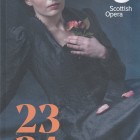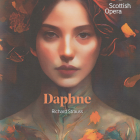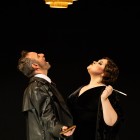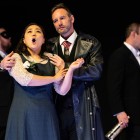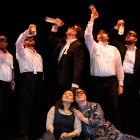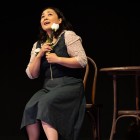Daphne 2023Scottish Opera
Read more about the opera Daphne
It is marvellous to see Scottish Opera continuing to mount concert performances of rare works. There are many opportunities with Richard Strauss who was a prolific composer in the genre.
Yet half of the Strauss operas are still to be performed in Scotland. One of the several challenges with this particular work may lie in casting. Daphne is vocally highly demanding for the long title-role, essentially a hymn to the soprano voice, and absolutely glorious. This work also requires two excellent tenors, one lyric and the other ferociously dramatic. The part of Gaea also requires an unusually deep contralto.
Described as a 'Bucolic Tragedy', Daphne takes place in a single act just like the two early Strauss masterworks Salome and Elektra. Daphne only received its British premiere as recently as 1987, when it was mounted by Opera North. These three concert performances represent its Scottish premiere, and it has not yet been given in London.
Daphne requires a big orchestra and the score is complex. Much of it is essentially lyrical in nature, but as the drama builds to the climax, the murder of the shepherd Leukippos by Apollo, the sound becomes quite overwhelming and is reminiscent of Elektra, composed by Strauss thirty years earlier. Stuart Stratford controlled it all in masterly fashion.
The first performance of these three, in Glasgow, was quite superb. It was a wonderful achievement that all the singers should have committed these complex roles to memory for only three performances. Further, although billed as 'concert' performances, it was staged by Emma Jenkins in an impressively dramatic manner. The stage was dark apart from a few feet at the front, and the furniture consisted of two bentwood chairs and a small table, the use of which was simple, yet it seemed all that was required.
The male chorus has an important role. The four identified Shepherds consisted of three basses and one tenor (Monwabisi Lindi). They opened proceedings as a quartet, and were later joined by a further four voices - two basses (Phil Gault and Jonathan Forbes Kennedy) and two tenors (Fraser Simpson and Connor Smith). As an octet they sang the chorus part beautifully and took an effective part in much of the action.
Costuming was simple. The two maids and Daphne's mother, all excellent, well differentiated voices, were dressed in 1930s style, black outfits and hairdos, complete with cigarette holders - representing the time of composition and with a hint of the Weimar Republic and perhaps a nod to the musical Cabaret. Catriona Hewitson is a familiar name, while Inna Husieva and Claire Barnett-Jones were welcome newcomers. Dingle Yandell, in full evening dress (complete with top hat), made an effective contribution as Daphne's father.
The dramatic tenor part of Apollo was very impressively taken by a newcomer, the Australian Brad Cooper. The part is vocally hugely demanding (a good bit longer than Bacchus in Ariadne). Cooper was also able to produce a contrasting element of subtlety showing his regret when he overhears Daphne's mourning of Leukippos - an emotion the Gods were unfamiliar with. His victim, the shepherd Leukippos, is more lyrical in style and vocally it suited Shengzhi Ren just fine. The title-role presents the soprano with appalling difficulties. She is hardly ever off stage and the vocal writing is hugely demanding. Hye-Youn Lee has now become something of a favourite with Scottish audiences, and this a very different role from what we are accustoed to - but she seemed competely untiring.
It was good to have a second opportunity to visit this fascinating production, at the Usher Hall on a very wet Sunday afternoon, 10 December. The changes are worth commenting on, though completely unaltered, even after a gap of three months, was the huge commitment from all concerned. A complete sense of involvement removed any idea that this ws 'just' a concert.
In Glasgow, the action occurred at the front of a blacked out stage, with the band in the pit - and the large brass section buried deep under the stage. In Edinburgh the playing area was in front of the band and all was brightly illuminated. There was a hint that the orchestra, especially those wonderful brass players, had been allowed out to play, and the sounds were wonderful, beautifully controlled by Stuart Stratford. Only occasionally, in the most Elektra- like sequences, was there any suggestion of singers being overwhelmed, but the voices were all so cleanly focussed that they projected with ease. Again the audience was hugely enthusiastic.
For hardened opera fans, we note that after these performances, there are still seven Strauss operas unperformed in Scotland. The most popular, by a long way, is Arabella, a fine social comedy. Die schweigsame Frau is derived from a comedy by Ben Jonson (Epicoene, or The Silent Woman) and has similarities to the plot of Donizetti's Don Pasquale. Two more use plot-lines from the composer's favourite source, classical Greece (Die ägyptische Helena and Die Liebe der Danaë). These are all big works in three acts, as is his first opera, the mediaeval drama Guntram. There are still, however, two operas composed in a single act as yet unknown in Scotland, or indeed anywhere else in the UK. These are his second opera, Feuersnot, and the work that immediately precedes Daphne, Friedenstag.
So still plenty for opera companies to explore in years to come.
Performance Cast
- Daphne a nymph
- Peneios a fisherman, father of Daphne
- Gaea mother of Daphne
- Leukippos a shepherd
- Apollo
- First Shepherd
- Second Shepherd
- Third Shepherd
- Fourth Shepherd
- First Maid
- Second Maid
